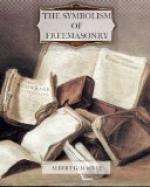[123] Exod. iii. 15. In our common version of the Bible, the word “Lord” is substituted for “Jehovah,” whence the true import of the original is lost.
[124] Exod. vi. 2. 3.
[125] “The Jews have many superstitious stories and opinions relative to this name, which, because they were forbidden to mention in vain, they would not mention at all. They substituted Adonai, &c., in its room, whenever it occurred to them in reading or speaking, or else simply and emphatically styled it the Name. Some of them attributed to a certain repetition of this name the virtue of a charm, and others have had the boldness to assert that our blessed Savior wrought all his miracles (for they do not deny them to be such) by that mystical use of this venerable name. See the Toldoth Jeschu, an infamously scurrilous life of Jesus, written by a Jew not later than the thirteenth century. On p. 7, edition of Wagenseilius, 1681, is a succinct detail of the manner in which our Savior is said to have entered the temple and obtained possession of the Holy Name. Leusden says that he had offered to give a sum of money to a very poor Jew at Amsterdam, if he would only once deliberately pronounce the name Jehovah; but he refused it by saying that he did not dare.”—Horae Solitariae, vol. i. p. 3.—“A Brahmin will not pronounce the name of the Almighty, without drawing down his sleeve and placing it on his mouth with fear and trembling.”—MURRAY, Truth of Revelation, p. 321.
[126] The same scrupulous avoidance of a strict translation has been pursued in other versions. For Jehovah, the Septuagint substitutes “[Greek: Ky/rios],” the Vulgate “Dominus,” and the German “der Herr,” all equivalent to “the Lord.” The French version uses the title “l’Eternel.” But, with a better comprehension of the value of the word, Lowth in his “Isaiah,” the Swedenborgian version of the Psalms, and some other recent versions, have restored the original name.
[127] In the Talmudical treatise, Majan Hachochima, quoted by Stephelin (Rabbinical Literature, i. p. 131), we are informed that rightly to understand the shem hamphorash is a key to the unlocking of all mysteries. “There,” says the treatise, “shalt thou understand the words of men, the words of cattle, the singing of birds, the language of beasts, the barking of dogs, the language of devils, the language of ministering angels, the language of date-trees, the motion of the sea, the unity of hearts, and the murmuring of the tongue—nay, even the thoughts of the reins.”
[128] The gamma, [Greek: G], or Greek letter G, is said to have been sacred among the Pythagoreans as the initial of [Greek: Geomeiri/a] or Geometry.
[129] Vide Oliver, Hist. Init. p. 68, note.




